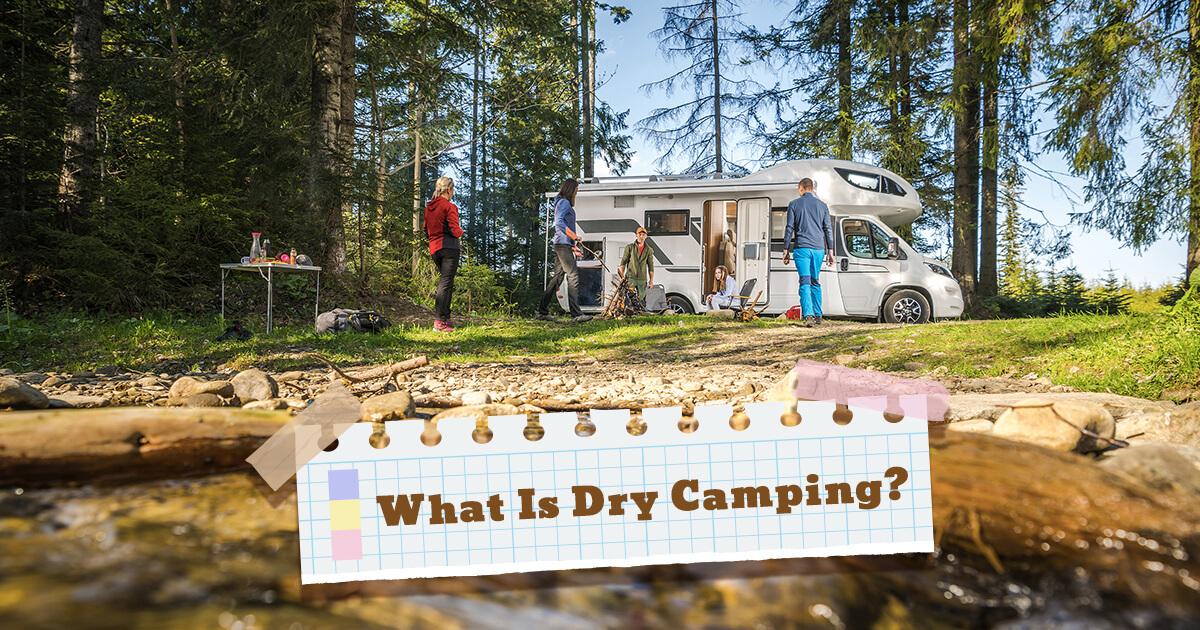What Is Dry Camping? Is It A Better Camping Activity?

Camping is a cherished outdoor activity that allows individuals to reconnect with nature, escape the hustle and bustle of daily life, and create lasting memories with friends and family. When the idea of camping comes to mind, you may imagine setting up a tent beneath the night sky or placing your RV in a scenic campground. However, there are two distinct types of camping experiences: dry camping and wet camping. In this article, we’ll delve into the world of dry camping, explore its meaning, discuss how it differs from wet camping, and finally, determine whether it offers a more enjoyable experience.
What is Dry Camping?
Dry camping, alternatively referred to as boondocking, is a distinctive approach to camping that venturesome individuals embrace, leading them away from modern conveniences and immersing them in the untamed wilderness. Unlike wet camping, where campers park their RVs in established campgrounds with amenities like water, sewer, and electrical hookups, dry camping involves setting up camp on public lands or remote areas without any access to these conveniences. When dry camping, campers rely solely on the provisions they bring along, making it a truly self-sustaining and immersive nature experience.
Does Dry Camping Require An RV?
Dry camping can be enjoyed with various camping setups, including tents, camper vans, or motorhomes. While RVs provide more comfort and amenities, dry camping doesn’t necessarily require an RV. Tent campers can also embrace the spirit of boondocking by finding secluded spots and setting up camp with minimal impact on the environment.
Dry Camping vs Wet Camping – What’s the Difference?
The key difference between dry camping and wet camping lies in the amenities and locations. Wet camping takes place in established campgrounds equipped with water, sewage, and electrical hookups, providing convenience and comfort for campers. On the other hand, dry camping occurs in more remote areas, away from designated campgrounds, and doesn’t offer access to man-made amenities. Campers must be self-reliant, managing everything from water supply to waste disposal.
Dry camping enthusiasts often seek solitude and a deeper connection with nature, whereas wet camping is preferred by those who prioritize comfort and easy access to amenities. While wet camping ensures a more predictable and reliable experience, dry camping allows adventurers to truly immerse themselves in nature’s beauty and experience a sense of freedom that comes with being off the grid.
Will Dry Camping Require Special Training or Knowledge?
Dry camping, with its self-reliant nature and remote locations, may require some additional training and knowledge to ensure a safe and enjoyable experience. Though not overly intricate, adequate preparation and knowledge can greatly impact the success of your dry camping journey.

1. Navigation and Maps
When dry camping in remote areas, GPS systems, and mobile networks may not be reliable. Gaining proficiency in reading conventional maps and utilizing a compass can assist you in navigating unfamiliar landscapes and returning to civilization if required.
2. Leave No Trace Principles
Dry camping often takes campers to pristine and sensitive environments. Comprehending and following the Leave No Trace principles is crucial to reduce your environmental footprint. This involves appropriate waste disposal, sticking to designated trails, and refraining from disturbing wildlife.
3. Water Management
Managing your water supply is crucial during dry camping. Learn how to conserve water by taking shorter showers, using water-efficient equipment, and planning meals that require minimal water for cooking and cleaning.
4. Battery and Power Management
Effective battery and power management are vital for RV dry campers. Understanding how to monitor battery levels, use power conservatively, and optimize solar panel charging (if applicable) will ensure a steady power supply during your trip.
5. Campsite Selection
Choosing an appropriate campsite is vital for a safe and enjoyable dry camping experience. Look for level ground to park your RV, avoid areas prone to flash floods, and consider factors like wind direction and sun exposure when setting up camp.
6. Emergency Preparedness
Being prepared for emergencies is critical in remote areas. Acquaint yourself with fundamental first-aid techniques, ensure you have a well-equipped first-aid kit, and understand how to signal for assistance during emergencies.
7. Weather Awareness
Weather conditions in remote areas can be unpredictable. Stay informed about weather forecasts before your trip, and be prepared for temperature fluctuations, rain, or strong winds.
8. Campfire Safety
If campfires are allowed in your dry camping area, know how to build and extinguish them safely. Follow fire restrictions and guidelines to prevent wildfires.
9. Self-Sufficiency
Dry camping requires campers to be self-sufficient. Acquire fundamental camping skills, including tent setup, campsite cooking, and resolving common camping equipment issues.
10. Wildlife Awareness
Research the wildlife in the area you plan to camp and understand how to safely coexist with animals. Ensure that your food is stored safely to prevent attracting wildlife to your campsite.
While special training is not mandatory for dry camping, investing time in learning these skills and acquiring knowledge can enhance your dry camping experience and ensure you are well-prepared for any challenges that may arise. Remember, the more confident and informed you are, the more you’ll be able to embrace the freedom and joy of dry camping in the great outdoors.
Is Dry Camping More Fun?
The question of whether dry camping is more fun largely depends on individual preferences and priorities. For those seeking adventure, challenge, and a closer connection to the great outdoors, dry camping often ranks higher on the fun scale. It offers a chance to escape the crowds, enjoy unspoiled landscapes, and experience the wilderness in its rawest form.
Dry camping also encourages campers to develop essential survival skills, resourcefulness, and self-sufficiency. It requires careful planning, packing the right equipment, and being prepared for any unforeseen challenges. The sense of accomplishment and self-reliance gained from successfully navigating a dry camping experience can be deeply rewarding.
On the other hand, wet camping provides a more comfortable and predictable camping experience. With access to amenities like running water and electricity, campers can focus more on leisure activities and relaxation. Families with young children or those who prefer a more relaxed camping experience might find wet camping to be more enjoyable and stress-free.
Final Thoughts
In conclusion, dry camping offers a unique and adventurous camping experience that takes campers off the grid and into the heart of nature. It requires self-reliance, resourcefulness, and a deep appreciation for the great outdoors. On the other hand, wet camping provides convenience and comfort, making it an attractive option for those seeking a more relaxed and predictable camping experience.
Ultimately, whether dry camping or wet camping is more fun depends on your personal preferences and what you value most in a camping trip. Both styles have their own merits and can offer unforgettable experiences. So, the next time you plan a camping adventure, consider trying dry camping for a truly immersive and rewarding experience in nature’s embrace. Happy camping!

